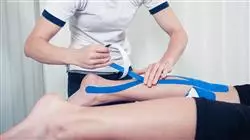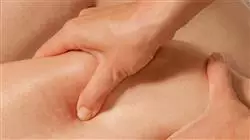University certificate
The world's largest faculty of physiotherapy”
Introduction to the Program
The latest diagnostic and therapeutic advances in Primary Care injuries”

Primary care is the most elementary health care and, at the same time, the most important area for health promotion, disease prevention and control in early stages.
Physiotherapists are part of a multidisciplinary team made up of a wide variety of professionals, so they must know how the system works in order to adapt quickly to it. It is essential, in turn, to master the theoretical-practical content of their specialty in order to deliver effective and quality work.
Each of our professors has a different specialty and training, which, coupled with their experience in the sector, will make the content more varied, adopting different points of view and always oriented toward students expanding their knowledge, regardless of their background.
What makes this program different from the rest is the collaborative work put into the different specialties that make up the theoretical-practical content, including up-to-date studies and analyses in Primary Care.
The program seeks to guide physiotherapists through the functions required in Primary Care, as well as to provide them with therapeutic tools and essential knowledge useful for professional work.
Get up to date on all the latest developments in the field of physiotherapy by completing the most effective program on the subject available on the market”
This Professional master’s degree in Physiotherapy in Primary Care contains the most complete and up-to-date scientific program on the market. The most important features of the program include:
- The latest technology in online teaching software
- A highly visual teaching system, supported by graphic and schematic contents that are easy to assimilate and understand
- Practical cases presented by practicing experts
- State-of-the-art interactive video systems
- Teaching supported by telepractice
- Continuous updating and recycling systems
- Autonomous learning: full compatibility with other occupations
- Practical exercises for self-evaluation and learning verification
- Support groups and educational synergies: questions to the expert, debate and knowledge forums
- Communication with the teacher and individual reflection work
- Content that is accessible from any fixed or portable device
- Supplementary documentation databases that are permanently available, even after the program
A comprehensive program created for physiotherapy professionals, which will allow you to balance it with other responsibilities and access it from any location with total flexibility”
Our teaching staff is made up of working professionals. In this way we ensure that we deliver the educational update we are aiming for. A multidisciplinary team of professionals who are trained and experienced in different environments, who will develop the theoretical knowledge in an efficient way, but above all, they will bring their practical knowledge from their own experience to the program: one of the differential qualities of this program.
This mastery of the subject is complemented by the effectiveness of the methodology used in the design of this course. Developed by a multidisciplinary team of e-learning experts, it integrates the latest advances in educational technology. This way, you will be able to study with a range of comfortable and versatile multimedia tools that will give you the operability you need in your training.
The design of this program is based on Problem-Based Learning: an approach that conceives learning as a highly practical process. To achieve this remotely, we will use telepractice learning: with the help of an innovative, interactive video system and Learning from an Expert, students will be able to acquire the knowledge as if they were actually dealing with the scenario they are learning about. A concept that will allow you to integrate and fix learning in a more realistic and permanent way.
With a methodological design based on proven teaching techniques, this program will take you through different teaching approaches to allow you to learn in a dynamic and effective way"

An effective and reliable program that will take you through an interesting learning process, so you acquire all the knowledge of an expert in the field"
Why study at TECH?
TECH is the world’s largest online university. With an impressive catalog of more than 14,000 university programs available in 11 languages, it is positioned as a leader in employability, with a 99% job placement rate. In addition, it relies on an enormous faculty of more than 6,000 professors of the highest international renown.

Study at the world's largest online university and guarantee your professional success. The future starts at TECH”
The world’s best online university according to FORBES
The prestigious Forbes magazine, specialized in business and finance, has highlighted TECH as “the world's best online university” This is what they have recently stated in an article in their digital edition in which they echo the success story of this institution, “thanks to the academic offer it provides, the selection of its teaching staff, and an innovative learning method aimed at educating the professionals of the future”
A revolutionary study method, a cutting-edge faculty and a practical focus: the key to TECH's success.
The most complete study plans on the university scene
TECH offers the most complete study plans on the university scene, with syllabuses that cover fundamental concepts and, at the same time, the main scientific advances in their specific scientific areas. In addition, these programs are continuously being updated to guarantee students the academic vanguard and the most in-demand professional skills. In this way, the university's qualifications provide its graduates with a significant advantage to propel their careers to success.
TECH offers the most comprehensive and intensive study plans on the current university scene.
A world-class teaching staff
TECH's teaching staff is made up of more than 6,000 professors with the highest international recognition. Professors, researchers and top executives of multinational companies, including Isaiah Covington, performance coach of the Boston Celtics; Magda Romanska, principal investigator at Harvard MetaLAB; Ignacio Wistumba, chairman of the department of translational molecular pathology at MD Anderson Cancer Center; and D.W. Pine, creative director of TIME magazine, among others.
Internationally renowned experts, specialized in different branches of Health, Technology, Communication and Business, form part of the TECH faculty.
A unique learning method
TECH is the first university to use Relearning in all its programs. It is the best online learning methodology, accredited with international teaching quality certifications, provided by prestigious educational agencies. In addition, this disruptive educational model is complemented with the “Case Method”, thereby setting up a unique online teaching strategy. Innovative teaching resources are also implemented, including detailed videos, infographics and interactive summaries.
TECH combines Relearning and the Case Method in all its university programs to guarantee excellent theoretical and practical learning, studying whenever and wherever you want.
The world's largest online university
TECH is the world’s largest online university. We are the largest educational institution, with the best and widest online educational catalog, one hundred percent online and covering the vast majority of areas of knowledge. We offer a large selection of our own degrees and accredited online undergraduate and postgraduate degrees. In total, more than 14,000 university degrees, in eleven different languages, make us the largest educational largest in the world.
TECH has the world's most extensive catalog of academic and official programs, available in more than 11 languages.
Google Premier Partner
The American technology giant has awarded TECH the Google Google Premier Partner badge. This award, which is only available to 3% of the world's companies, highlights the efficient, flexible and tailored experience that this university provides to students. The recognition as a Google Premier Partner not only accredits the maximum rigor, performance and investment in TECH's digital infrastructures, but also places this university as one of the world's leading technology companies.
Google has positioned TECH in the top 3% of the world's most important technology companies by awarding it its Google Premier Partner badge.
The official online university of the NBA
TECH is the official online university of the NBA. Thanks to our agreement with the biggest league in basketball, we offer our students exclusive university programs, as well as a wide variety of educational resources focused on the business of the league and other areas of the sports industry. Each program is made up of a uniquely designed syllabus and features exceptional guest hosts: professionals with a distinguished sports background who will offer their expertise on the most relevant topics.
TECH has been selected by the NBA, the world's top basketball league, as its official online university.
The top-rated university by its students
Students have positioned TECH as the world's top-rated university on the main review websites, with a highest rating of 4.9 out of 5, obtained from more than 1,000 reviews. These results consolidate TECH as the benchmark university institution at an international level, reflecting the excellence and positive impact of its educational model.” reflecting the excellence and positive impact of its educational model.”
TECH is the world’s top-rated university by its students.
Leaders in employability
TECH has managed to become the leading university in employability. 99% of its students obtain jobs in the academic field they have studied, within one year of completing any of the university's programs. A similar number achieve immediate career enhancement. All this thanks to a study methodology that bases its effectiveness on the acquisition of practical skills, which are absolutely necessary for professional development.
99% of TECH graduates find a job within a year of completing their studies.
Professional Master's Degree in Physiotherapy in Primary Care
.
For any member of the healthcare body in a unit or service center prioritizing the proper anamnesis and intervention of a patient is one of the cornerstones in the daily work. Without the right attitudinal and aptitudinal components, the professional involved will hardly be able to make healthcare an accessible, comprehensive, coordinated and efficient system. None of the medical-clinical branches is exempt from this, that is why in TECH Global University we have developed the Professional Master's Degree in Physiotherapy in Primary Care, a deepening of the therapeutic work and motor and/or musculoskeletal rehabilitation from a multidisciplinary approach to optimize specialized care. The program is designed to be taught from an exclusively digital environment, so the student will have access to flexible schedules, multimedia content of the latest technology and ability to receive the lessons from any fixed or mobile device with internet connection. We offer rigorous content structured in ten modules, pleasantly interactive and with professors of notable experience in the field, which will boost your profile to an elite category.
Dare to become a great physiotherapist
.
Would you like to add to your curriculum competencies in electrotherapy management, neurophysiology or even therapeutic approach for pediatrics? Through our Professional Master's Degree we will instruct you in an innovative way on these topics and many others that will be extremely useful to you in providing remarkable quality primary care. Initially we will update you on the organizational and legislative framework of the health care service, and then we will reinforce the fundamentals and dynamics of a physiotherapy unit. We will then move on to the different types of manual and active therapies, practical tools such as ultrasound, neurorehabilitation, treatment of the craniocervical and lumbosacral regions, just to name a few. The program is so complete that we will even teach you about cardiorespiratory physiotherapy techniques and primary care for COVID-19. It is well known that the physiotherapy service is one of the labor sectors with the highest demand for both patients and qualified personnel. Here at TECH we open the doors for you to make this specialty a rewarding livelihood resource.







